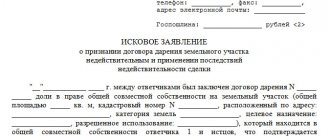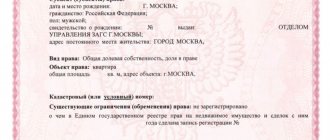The concept of deed of gift
A deed of gift is a document according to which the donor transfers real estate or a valuable thing for free use to the donee. Features of donation transactions are regulated by Ch. 32 Civil Code of the Russian Federation:
- The procedure must be previously agreed upon by both parties. They need to agree on what exactly will be donated, on what day they will conclude the donation agreement and have it certified by a notary.
- The recipient has the right to refuse the gift. If a deed of gift was issued for it, the refusal is also drawn up in writing.
- A gift agreement must be concluded if the value of movable property exceeds 3,000 rubles, or real estate is donated: an apartment, a garage, a house, a plot, etc.
- If real estate is transferred as a gift, the agreement is registered with Rosreestr in the presence of both parties.
Important! The donor may cancel the gift agreement at any time if the recipient has made an attempt on his life and health or on his relatives. If the court finds that the cause of death was the criminal actions of the donee, the agreement is also canceled, and the previously donated property is distributed among the heirs of the deceased.
The entire donation procedure is as follows:
- The parties agree on when, where and what will be given, when and with which notary they will conclude the agreement.
- A state fee is paid for certification of the contract. If the notary is also involved in its preparation, an additional notary fee is paid.
- The donee and the donor come to Rosreestr if the subject of the gift is real estate. There documents are submitted to register ownership.
- A few days later, the donee visits Rosreestr to receive an extract, where he will be indicated as the new owner.
Types of agreement
You can issue one of the following forms of deed of gift:
| Document type | Description |
| Real | The essence of the document is the transfer of property rights at the time of completion of the transaction. |
| Consensual | Property will pass into other hands only under certain conditions specified in the contract, for example, you can write that the recipient will receive the apartment 3 years from the date of drawing up this document. |
| Donation | The donation is for general benefit purposes. The recipient of the property must be a legal entity. The donor has the right to monitor the use of the transferred property, based on the purpose and purpose written in the agreement. |
The agreement is drawn up in writing. According to Article 574 of the Civil Code of the Russian Federation, oral donation is permissible under certain conditions:
- Only movable property is donated;
- the role of the donor is played by an individual;
- the gift should not cost more than 3 thousand rubles;
- the transfer of the gift takes place at the time of conclusion of the transaction.
Functions of deed of gift
The main task of the deed of gift is to formalize the donation transaction. Thanks to it, the new owner of the property will be able to fully use it and, if necessary, confirm that the gift was purchased legally.
Many people do not know which is better - a deed of gift or a will, and also mistakenly assume that the gift agreement can indicate the possibility of transferring real estate into ownership only in the event of the death of the donor. A document containing such a condition is considered void.
There is a fundamental difference between donation and inheritance: in the first case, the transfer of ownership is possible only during the life of the owner, and in the second, property is distributed only after his death.
Important! You can get an answer to one more question - if there is a deed of gift, is it necessary to enter into an inheritance - in the Civil Code of the Russian Federation. It clearly states that when the donee manages to transfer the property to himself under a gift agreement, it becomes his full property, so entering into an inheritance is relevant if he is included in the circle of legal successors and other things that do not belong to him are inherited.
What to do if the citizen to whom the house was given as a gift dies?
Most people are concerned about the problem of whether it is realistic to return a gift when the testator dies. Russian legislation establishes that at the time of the death of the donee, the gift agreement is considered invalid, since at this moment the recipient of the gift is no longer alive.
It is possible to prepare an agreement on a deed of gift for the spouse or child of the deceased, then such a transaction will undergo a thorough check in Rosreestr. A deed of gift should be classified as a rather difficult legal agreement that is almost impossible to challenge. Every moment when the person who provided the property as a gift is returned his property, as well as events when the transaction can be revoked, are recorded in the Civil Code of the Russian Federation.
In the event of the death of the donor, when the rules for returning the house or land to the previous owner are not signed, the property is transferred to part of the inheritance and is able to transfer to the heirs of the deceased according to law. A gift agreement is a process in which one citizen acquires a gift from another and can use it by any methods permitted by law. The primary nuance in making a transaction: there is no need to sign a gift agreement with a lawyer, but this should be done by everyone who is not considered strong in legal knowledge.
For the transaction to become official, you must visit Rosreestr or the MFC yourself and provide all the necessary certificates to sign the right to own property, a sample of which is presented on the official website.
The law of the Russian Federation establishes that any person can bestow property, but in fact, in order to carry out the transaction, each person must be alive. If the deed of gift contains other items that contradict the law, the transaction may be recognized as void, since the donation is a gratuitous gift from one citizen to another.
Inheritance procedure
According to the law, inheriting an apartment using a deed of gift is impossible due to the fact that this document involves the transfer of ownership only during the life of the donor. If a gift agreement was drawn up but not registered with Rosreestr, the property indicated in it as a gift passes into the general inheritance estate.
If we are talking about a deed of gift for an apartment after death, when it was drawn up and registered properly, then subsequently the heirs will not be able to claim it - the property will belong only to the gifted person.
Thus, inheritance under a deed of gift is impossible. To transfer real estate to inheritance, the testator must draw up a will. There is another option - entering into inheritance by law. There are significant differences between these two methods:
| Will | Inheritance by law |
| Any person who is not a relative can receive property | Real estate is inherited by relatives of 1-3 degrees of kinship, and in the absence of such, by subsequent ones. If there are no relatives of the first degree, those of the second degree enter into inheritance. |
| The citizen draws up a document with a notary, where he indicates to whom exactly and in what shares the property is transferred | There is no will, inherited property is distributed evenly among all legal successors |
Another popular question is to whom the donated apartment is transferred after the death of the donee. According to the law, this property is the full property of the gifted person, therefore, in the event of his death, the right to it arises from the heirs. The donor's relatives cannot claim it.
Let's look at a detailed example:
Ignatov O.L. gives the house to his friend N.N. Maksimov. The transaction was completed on June 16, 2017, 2 days later the parties submitted documents to the MFC to re-register ownership. Maksimov received an extract from the Unified State Register on June 25, 2017, and a week later he dies. He is survived by his wife and child – they receive this property by inheritance. Alferov E.V. cannot claim it, despite the fact that the house was originally bought with his money - there is a deed of gift, and the property legally belongs to the Maximov family.
The object of the deed of gift - what can act as a gift in 2021
The object of donation in 2021 can be any property rights or benefits that are not excluded from civil circulation!
ARTICLE RECOMMENDED FOR YOU:
Giving money in 2021
In addition, the ownership of an item donated free of charge must be registered in accordance with the laws in force at the time of the emergence of this ownership. This is especially true for real estate objects that have been completed or rebuilt, and their current plan differs from the previously approved one. Thus, real estate that does not comply with the documentation cannot act as an object of donation!
Lawyer's Note
We remind our visitors that a gift agreement can be not only real, but also consensual! Simply put, it can be in writing and contain a promise by the donor to carry out a transaction in favor of the donee in the future.
Also, do not forget that one of the fundamental norms when drawing up an agreement is a detailed indication in the content of the gift agreement of all the important characteristics and properties of the object of the gift, distinguishing it from other similar objects.
For example, if the gift is real estate, then, according to Part 2 of Article 572 of the Civil Code, the content should include:
- physical address of the object;
- its actual area (residential and non-residential);
- title documents for real estate, etc.
How a donated apartment becomes an inheritance
Drawing up a deed of gift means that after registering the property, the former owner loses the right to it, and the new owner can independently dispose of it: gift it to other people, sell, exchange, bequeath.
The entire procedure for inheriting an apartment received by gift, from the moment of drawing up the contract to receiving the certificate of inheritance, looks like this:
- One citizen enters into a gift agreement with another. The gifted person re-registers the property together with the donor in Rosreestr, and subsequently dies.
- Relatives of the gifted person enter into the inheritance by submitting an appropriate application for acceptance within 6 months after the death of the testator.
- If inheritance is made according to a will, the inheritance is received by the persons specified in it. When inheriting by law, property is distributed in equal shares among all relatives of the corresponding degree of relationship.
- If a will has been drawn up, but there are persons entitled to an obligatory share in the inheritance, they receive it in the same amount as in the case of inheritance by law, even if this causes a reduction in the shares of other persons. You will have to share with them, regardless of the contents of the testamentary document.
Six months after the opening of the inheritance case, the notary issues a certificate of the right to inheritance. With it, the assignee goes to Rosreestr and re-registers the property in his name.
Features of compilation and design
A gift agreement is drawn up between the donor (owner of the property) and the recipient. Contacting a notary is not necessary, but lawyers still recommend having the document certified to avoid controversial issues:
- The notary has the right to act as a witness confirming the legality of the deed of gift.
- Any inaccuracy in drawing up a document leads to disastrous consequences. The notary is not interested in challenging the agreement he has certified, so he will immediately point out controversial issues and advise on options for changing the text.
- The registration authority will refuse to accept a document if the form of writing has been violated. The parties will have to start all over again, which will delay the donation process for another 2-3 months. In turn, the notary would not certify an incorrectly completed agreement.
Depending on the price of the property and the degree of relationship between the parties, the state duty varies from 3 to 20 thousand rubles. Other services (text writing, consultations) are paid separately. The algorithm for writing and registering an agreement on the transfer of property as a gift is as follows:
- Preparation of documentation: Identity card (donor and recipient).
- Certificate of marriage, if one of the parties has one.
- A power of attorney to act on behalf of the owner of the property or the recipient.
- Title papers.
- A document confirming the absence of encumbrances on the property.
- information about the parties;
- property: apartment;
- death of one of the parties;
Separately, you can write down clauses regarding inheritance by gift and death of one of the parties to the agreement.
Is it possible to make a donation after the death of the owner?
Another frequently asked question concerns what to do if there is a deed of gift - who has the right to inheritance? Here everything depends on the re-registration of ownership: if it was completed before the death of the donor, the donee is considered the owner. If there is a gift agreement and there is no registration, the property is included in the general inheritance mass, and the donee will not be able to use it.
If the owner of a home wants it to belong to a specific person only after his death, it is necessary to draw up not a deed of gift with such a condition, but a will. If a clause on the transfer of ownership only after the death of the owner is included in the gift agreement, the document is considered void.
Is it possible to challenge?
Situations when legal heirs have claims to a gift agreement are quite common. Often such cases become a pretext for consideration in the courtroom.
Many people are interested in whether it is possible to challenge a gift after the death of the donor. Considering the above arguments, the legal heirs have a valid reason to assert their rights and consider the contract invalid. This is explained by the fact that this action should be carried out only during life.
Heirs have a good chance of challenging the deed of gift after the death of the donor if the papers for ownership of the property were not completed before this fact. The date of complete transfer of ownership is the entry into the state registration authorities.
Donated apartment after the death of the donee
It is possible to return an apartment given to another person after his death only if the deed of gift contains the corresponding clause. If it is not there, the heirs of the donee will receive the property.
There is an alternative option - challenging the deed of gift through the court. This is possible if it is proven that the execution of the agreement resulted in a significant deterioration in the financial or property situation of the donor.
To understand the peculiarities of transferring ownership of an apartment by deed of gift, to whom it is inherited and other nuances, it is enough to familiarize yourself with a practical example:
Alferov E.V. owns a three-room apartment. In May 2021, he decided to give it to his daughter. He also has a son from a previous marriage. The purpose of concluding a gift agreement is to leave another child without an inheritance, because There has been no contact with him for several years.
In June 2021 Alferov E.V. dies, and his son decides to challenge the deed of gift. To do this, he goes to court, indicating that, based on the degree of relationship, he has the same rights as his sister and could have inherited the apartment if the gift agreement had not been drawn up.
The court rejected this request due to insufficient grounds for canceling the transaction, because it was committed at the will of the former owner, and the donated property was acquired by him jointly with his wife, with whom he was married at the time of death.
Donation of real estate
2 types of agreement:
- Real. Property or things are transferred as a gift to the other party. The agreement is considered concluded at the moment when the gift passes into the hands of the new owner. This happens immediately after registration procedures with this document.
- Consensual. When does the agreement come into force? The peculiarity of the agreement is that it does not contain property, but a promise to donate it. And this provision dictates the need to comply with the conditions when drawing up a consensual gift agreement:
- written form is required;
- an indication of a specific apartment that is promised to the donee in the future;
- freedom of contract;
- consent from the second party to accept the property, but in the future tense.
This transaction is considered concluded on the day the new owner takes possession of the apartment. In the same way, you can transfer not only housing, but also rights and release from obligations.
Why do subjects of law prefer to enter into such transactions?
Let's look at the merits of giving and answer this question.
- A simple written form of the document. The parties do not need to contact a notary or pay extra money. It is enough to draw up an agreement and seal it with signatures.
- For married people, giving is beneficial for one reason. For example, citizen M. gave his son, citizen I. an apartment. Citizen I. lives in an official marriage with citizen Y. If a purchase and sale agreement were drawn up between father and son, the apartment would be the property of both spouses, since it was acquired during marriage. But the donation gives the right only to citizen I. to full possession of it, without the participation of citizen Yu.
- If the owner has a share in the apartment, he has the right to give it to any person. This is his property. If he were to sell this share, he would have to have contacts with the co-owners regarding the right of first refusal.
- Efficiency of concluding a deal. If, after signing the contract, a transfer and acceptance certificate of the property is drawn up, the new owner already assumes his rights.
- The apartment can be given as a gift with an encumbrance. These are the persons registered there. They can be written out, even without the consent of these persons, but through the court.
- If the agreement is concluded between relatives, then they will not pay tax to the state treasury. It is equal to 13% of an individual’s income.
In all other cases, tax is paid. This is 13% of the value of the gift.
- Ease of challenge.
Is the gift agreement terminated?
Termination of a deed of gift at the initiative of the donor is carried out only in court and if there are legal grounds:
- Deterioration of the financial situation of the former owner.
- Inappropriate handling of property by the gifted person, if this threatens its destruction or loss.
- Death of the gifted person, if this clause was specified in the contract.
As for termination at the request of the donee, such transactions are not contested in court - simply re-registration of documents in Rosreestr is sufficient.
What happens to the deed if the donor dies?
In the event of the death of the donor, the question of the right of inheritance arises between relatives, especially if it turns out that the deceased executed a deed of gift during his lifetime to a certain person.
Can heirs apply for housing if they have a document?
If there is a deed of gift executed before the death of the property owner, relatives have a way to challenge the deed of gift in order to claim inheritance of the property. Relatives must act within three years after the death of the donor; after this period, it will be almost impossible to challenge the transaction. The deed of gift can only be challenged in court.
The deed of gift is disputed on the following grounds in accordance with clause 1. Art. 578 Civil Code of the Russian Federation:
- incapacity of the donor;
- putting pressure on the property owner;
- incorrect execution of the document (how to formalize a donation correctly?);
- if the donee has committed a crime against the donor or his close relatives;
- when donating jointly acquired property, if there is no consent to the transaction by the other spouse (we wrote about the transaction of donation in marriage here);
- an imaginary transaction to cover up another business, most often illegal;
- if the object of the gift is pledged or there are other owners.
There are several relatives who can challenge the deed of gift and enter into the right of inheritance in turn:
- priority heirs - spouses, children, parents in accordance with clause 1 of Article 1142 of the Civil Code of the Russian Federation;
- heirs of the second stage or other interested parties.
A registered and correctly executed deed of gift cannot be challenged only at the request and doubts of the heirs.
How can you disinherit other relatives?
In practice, situations often occur when all the documents for the transfer of a gift are prepared, but the time for registering the transaction is postponed for some reason. In situations where the donor died before registration, it will be quite difficult to claim ownership of the property. But provided that all documents are drawn up correctly and the parties have registered the transaction in Rosreestr, then challenging this transaction will be a more difficult procedure for the heirs.
Another way is to indicate in the contract the transfer of gift obligations to the relatives of the donor on the basis of clause 2 of Article 581 of the Civil Code of the Russian Federation. Then, in the event of the death of the donor, the relatives are obliged to fulfill his dying will and complete the act of donating property.
If conflicts arise with heirs of property, you should go to court by hiring a competent lawyer.
The procedure for challenging a deed of gift
Citizens are often interested in the question of whether an apartment under a deed of gift is disputed after the death of the donee or donor. It all depends on the circumstances of a particular case. For example, persons interested in receiving an inheritance can apply for annulment of a transaction if the real estate could be included in the inheritance mass: children, grandchildren, wives, husbands. In this case, the degree of relationship of applicants for property must be taken into account.
Important! After a divorce, a husband cannot claim his wife’s personal property. An equivalent rule also works in the opposite direction: divorce means the termination of all obligations, incl. and property, if a petition for its division was not previously submitted within the established time frame. Former spouses retain only the obligation to raise and support their common children.
Who can challenge a deed of gift
If interested parties have information about the illegality of the transaction or other grounds, they can challenge the registration of the deed of gift. The circle of such persons includes any relatives, regardless of degree (only the order is taken into account), as well as ex-wives if the transaction affects the legitimate interests of a child common to the donor.
State and municipal bodies also have the right to appeal to challenge property transactions if they have learned of a violation of the rights of minors or incompetent citizens (representatives of guardianship or social protection authorities, etc.).
Grounds for challenge
In addition to how a donated apartment is inherited and whether it can be annulled, it is important to know the grounds for challenging:
- The donor being under the influence of alcohol or drugs at the time of execution of the transaction, incapacity. According to the law, transactions on behalf of incapacitated citizens are made on their behalf only by authorized representatives. Here you will need evidence: a court decision, audio or video recordings, witness testimony.
- Concluding a gift agreement under the influence of moral or physical pressure. In this case, after examining the evidence, the court will cancel the deed of gift, and the guilty person will be brought to criminal or administrative liability depending on the severity of the act.
- Absence of written consent to the donation from the second spouse, if the gift was made out of property acquired jointly during the marriage.
Important! When going to court to challenge, you will need any evidence, even indirectly indicating the illegality of the transaction.
Grounds for recognizing a deed of gift as void
A deed of gift is considered void if it is established that it was drawn up in violation and has no legal force. This usually happens in the following cases:
- The gift agreement is filled out incorrectly: the details of the parties or the item (gift) are not indicated; content of blots and errors that significantly distort information.
- The sham of the transaction: the donation was formalized, but in fact the real estate was not registered with Rosreestr. This occurs when the donor wants to hide his property status or prevent others from inheriting property.
- Pretense of the transaction: in order to be exempt from paying state duties and taxes on income, sellers act as donors, and buyers act as recipients.
How to draw up and execute a real estate gift agreement: features of the agreement
In order to register property as a gift, you must have the following documents:
- Passports on both sides.
- Documentation from the Unified State Register of Real Estate.
- A document from the house register about the people registered in the property.
- Confirmation by the registry office of family relationships.
- If there are minor children, consent of the guardianship and trusteeship authorities.
- If someone will enter into a transaction through representatives, they need a power of attorney, which is certified by a notary.
- Property owner's application for deed of gift.
- Documents that confirm the absence of debt for housing and communal services.
- Agreement on making a gift from a spouse.
- Cadastral document.
- A document that contains technical characteristics.
- A receipt confirming payment of the state duty.
The law establishes that once the application is submitted, legal authority to own the house or other property is formalized. At the time indicated by the employee, the new owner who received the property is obliged to visit Rosreestr and accept a special extract, which will confirm his right to the property.
Time limits for challenging
It all depends on the specific circumstances:
- If the reason for the challenge is the bankruptcy of the donor, he is given six months from the date of execution of the contract.
- In other cases - three years from the moment the donor became aware of the violation of his rights.
If the donee exerted pressure on the donor, the period begins to count from the moment the illegal actions cease. If a citizen decided to challenge the transaction, but was unable to do so on time, he has the right to petition for the restoration of the deadlines through the court if there are good reasons why he did not appeal to challenge it in a timely manner: serious illness, living in another country, being on a business trip, lack of information on the alienation of property.
The deed of gift is issued on a gratuitous basis during the life of the donor. After his death, only his heirs can receive the property. A gift agreement with the condition of transfer of ownership only in the event of the death of the owner is recognized as void and has no legal force. If it is drawn up according to all the rules, and after registering the property the gifted person dies, his relatives will be able to transfer everything to themselves in the order of inheritance.
Options for challenging a document
When registering a deed of gift in accordance with all the rules described in the Civil Code, the donor has the right to challenge it in the following cases:
| Causes | Description |
| The recipient has died | The document contains a clause on the return of property in the event of the death of the recipient. |
| The donated property is not taken care of. | A citizen who received property as a gift does not comply with sanitary standards and causes intentional damage to property. |
| The donor receives threats from the new owner of the property | The recipient carries out actions that threaten the life of the donor. |
| A pensioner donated his only home | The conditions for the person who decides to make a gift are clearly unfavorable. The legal authority may step in and declare the contract invalid. |
The procedure for revoking a contract takes place in court. If the donor died due to the actions of the recipient, then his relatives have the right to act as initiators of the proceedings.
How to dispute
After registering the right to an apartment in the Unified State Register of Real Estate, the only way to reverse the situation is to challenge the deal through the court. The right to contest after the death of the donor is acquired by the interested heirs. If the heirs believe that the apartment was removed from the property of the deceased illegally, as a result of deception or fraud, they should prepare for court.
First you need to choose a suitable basis for invalidating a transaction. According to the current Civil Code, the basis may be one or more facts:
- the donor did not understand the significance of his actions, and if there is a certificate of his mental illness, this is an almost 100% success of the challenge;
- the donee forced the donor into the transaction through threats, blackmail or abuse of trust;
- the donation was obviously a disadvantageous transaction for the donor, which the recipient knew about and took advantage of in bad faith;
- if in fact there was not a donation, but a purchase and sale, barter, loan or other transaction;
- the donor re-registered the apartment under a deed of gift in order to avoid administrative, tax or subsidiary liability for bankruptcy;
- the transaction is formalized in simple written form, although it must be notarized;
- the contract contains clauses on the provision of money, maintenance or other compensation in exchange for the apartment.
Attention! If the donor was in the hospital at the time of signing the contract, this cannot be an independent basis for canceling the transaction. It is necessary to prove that he did not understand what he was doing, or signed the agreement clearly to his detriment.
If a basis is found, you need to write a statement of claim, print it in three copies, attach documents and submit two of the three packages to the court. The employees will independently send the materials to the defendant.
the statement of claim can be found here.
As evidence you will need:
- documents for the apartment - extract from the Unified State Register of Real Estate;
- death certificate, papers on the relationship of the donor and heirs;
- copy of the deed of gift;
- other evidence;
- receipt of payment of duty.
The duty is calculated from the price of the apartment:
To save money, get a certificate of the inventory value of housing from the BTI. As a rule, it is lower than the market or cadastral value.
Read more about the procedure for challenging a deed of gift at this link.
Giving a gift: what is it and who can act as a party to it
The concept of the transaction in question follows from the Civil Code of the Russian Federation and is characterized by the transfer of rights to a thing or property rights at the will of one person to another without the requirement of any mutual remunerative actions. A special case of presenting a gift can be called a donation, but its main feature is the socially useful purpose for which this or that thing is given. The recipient of property under such an agreement, as a rule, can be the state, a municipality or a non-profit organization.
Both transactions, as a fundamental condition, presuppose the gratuitous transfer of ownership of the item. If in return the transferring party receives something from its counterparty (some other thing, certain services or work), then the contract covers another compensated transaction. In this case, it is void and all relevant consequences established by the Civil Code are applied to it.
The role of counterparties to this type of transaction can be all individuals and legal entities, and in the case of a donation, also public legal entities (the Russian Federation, a subject of the Russian Federation, as well as a municipal entity). The citizen must have full legal capacity to enter into such an agreement on his own behalf and in his own interests. The party transferring the thing is called the donor, and its new copyright holder is called the donee.
Incompetent citizens (recognized as such by the court and minors) can enter into such legal relations as persons receiving property through their representatives appointed or who are such by force of law. In the absence of a legally established need for notarization of a transaction or its state registration in Rosreestr, minor citizens (including minors) can accept gifts on their own.
As for the party transferring the thing, the law directly prohibits such actions on behalf of minors and incapacitated persons. As an exception, such gifts are provided whose value is less than or equal to 3 thousand rubles.
Warning
A similar rule on limiting the value of a gift is established by civil legislation in relation to employees and workers of state and municipal institutions. This measure is aimed at combating corruption in these areas.
Regarding legal entities, there is also a legal restriction on the entry into civil legal relations of gratuitous gifts. Such agreements cannot be concluded and implemented between organizations carrying out commercial activities as their main type. This is due to the state’s attempts to prevent organizations from evading tax payments, but in practice it can be inconvenient. Thus, it is impossible to write off bad debts except after the expiration of the period established by law.
Donation with condition
A donation made in the event of the occurrence of circumstances determined by the parties and the occurrence of which they do not know for sure, from the point of view of the Civil Code of the Russian Federation, is made with a suspensive condition. In most cases, taking into account the specifics of the condition, such a gift will be of an incentive nature for the recipient to achieve some goal. In this case, the parties cannot connect the gift with the occurrence of circumstances that are contrary to legal norms and generally accepted moral standards.
By definition, a suspensive condition has the following characteristics:
- is associated with the occurrence of circumstances that are independently determined by the parties to the agreement;
- implies the occurrence of something in the future tense, after the conclusion of the transaction;
- the parties cannot definitely know whether it will occur or not (to put it colorfully, the parties cannot connect the moment of transfer of the gift with a solar eclipse, because its exact dates are well known to the scientific community).
Attention!
If the counterparties provide for such a condition under which circumstances occur in any case, the transaction will not be invalid. The only consequence in this case is recognition of it as unconditional. In the latter case, the recipient of the thing may demand its transfer to him immediately.
If there is a conditional clause in the text of the agreement after its signing, the counterparties do not bear any real rights and obligations towards each other until the occurrence of a certain event. However, the deal has been concluded and cannot be terminated at the initiative of one of the parties without compelling circumstances.
The occurrence of an event that the parties have determined as a condition for the transfer of ownership of the property gives rise to the obligation of the donor to transfer what was promised. The other party has a counter-right to demand the transfer of the promised gift, and if the donor fails to fulfill his obligation, to protect his interests by all available means, including by filing a statement of claim in court.
When is the best time to apply?
Many citizens believe that a deed of gift is a document that can be concluded after the death of the donor. In fact, this opinion is wrong. If the copyright holder dies, then all the property that remains after him is inherited by his legal successors.
If there is an object such as an apartment among the inherited property, there may be several options:
- The agreement was concluded during the life of the donor.
In this case, the donee acquired the right of ownership until the death of the donor. After the death of the donor, the property remains in the possession of the donee, since he has already become the legal owner. The donated apartment will not be part of the inheritance; accordingly, legal successors cannot claim rights to it.
- The owner wanted to conclude an agreement, but did not have time to do so.
In fact, the transaction was not completed, even if the deceased had intentions to donate housing. Ownership remains with the deceased, and his successors can lay claim to the property.
There are also other situations when a number of issues arise with donated housing. For example, if a donation transaction was carried out, but subsequently the recipient died. Can the donor cancel the agreement?
Expert opinion
Klimov Yaroslav
More than 12 years in real estate, higher legal education (Russian Academy of Justice)
Ask a Question
Since the ownership right has passed to another owner - the donee - it is no longer possible to cancel the transaction. After the death of the recipient, the donated apartment will go to the heirs of the latter.
Difference between deed of gift and will
“In essence, both documents perform a single function,” clarifies Daria Morozova. — It consists of a legally justified and lawful transfer of property into the ownership of another person. But in practice, questions and nuances often arise that need to be taken into account.”
Moment of transfer of ownership
As already noted, in the case of a donation, it occurs at the time of registration of the agreement. In addition, the very fact of donation must be gratuitous, that is, the donor must not demand anything in return from the recipient.
A will is also essentially free of charge, but the owner remains with his property until the end of his days, which is much more reliable for him than relying on the will of relatives.
Availability of signature
A deed of gift is an agreement in which the donor expresses his right to transfer property and confirms it with his signature. And the recipient accepts the gift, in confirmation of which he also puts his signature. There is only one signature in a will - the testator. The person to whom the property is intended does not require consent at the time of drawing up the document.
Possibility of changing the decision
If we talk about what is more reliable—a deed of gift or a will—then the deed of gift looks more convincing. The fact is that after it is drawn up and signed, the donor loses the rights both to the property and to make changes to the agreement itself. In fact, this is the final point in his property rights: after signing the contract, he can no longer make any decisions regarding the property.
If we are talking about a will, then it can be changed countless times. Today the grandmother wants to transfer the apartment to her granddaughter and writes a document in her favor. Tomorrow she and her granddaughter quarreled, and the grandmother decided to sign over the property to her grandson. She has every right to do this, and her first will will become invalid once the second one is signed.
Opportunity to challenge in court
As for the question of what cannot be challenged in court - a deed of gift or a will - here the first document is again more reliable. Of course, relatives can go to court after the death of the property owner and demand that the court terminate the gift agreement. However, as practice shows, these requirements usually lead nowhere. But the chances of challenging a will are much greater, and such claims are brought to the courts more often.
Only taking into account all these nuances can the owner decide what to draw up: a deed of gift or a will. At the same time, the price issue is not the least important.
pixabay.com/congerdesign
What is more profitable – a will or a deed of gift?
Will or deed of gift for an apartment – which is better for the owner to choose? The main criteria by which you can evaluate the way of disposing of your real estate are the timing, complexity of registration and its price.
Registration cost
The price of registration of a deed of gift depends on the value of the real estate being donated and the proximity of the relationship between the donor and the recipient. For close relatives it looks like this:
- for state registration of a self-drafted gift agreement, the fee will be 2,000 rubles;
- when drawing up a deed of gift through a notary, he will take 3,000 rubles. for services and a fee of 0.2% of the housing price, but not more than 50,000 rubles.
If the recipient is a distant relative or even a stranger, then the price of the issue changes:
- for real estate value up to 1 million – 3000 rubles. + 0.4% duty;
- at a cost of 1 to 10 million rubles. – 7000 rub. + 0.2% duty;
- at a cost above 10 million rubles. – 25,000 rub. + 0.1% duty (but not more than 100 thousand rubles).
In addition, when receiving real estate as a gift, the recipient is required to pay income tax (NDFL) in the amount of 13% of the value of the property received. In such a situation, only close relatives of the donor are exempt from taxation, which the law includes parents, grandparents, brothers or sisters, children, and grandchildren.
When drawing up a will, you will only have to pay for the fact that it has been certified by a notary - 100 rubles. and for the valuation of inherited property. The main expenses will arise only at the time of opening an inheritance case and receiving a document for the right of inheritance - from 0.3 to 0.6% of the value of the property.
Registration deadlines
The period for registering a gift agreement should not exceed 2 weeks. In rare cases, it will take a month to obtain a USRN certificate. It will take several hours for a notary to draw up a will.
However, if the object of the donation is only a share in an apartment or house, you will have to spend time allocating the owner’s share (room, utility premises) in physical terms. This is done through the court in order to subsequently protect the rights of other owners and avoid discrepancies when using joint property or its possible sale. After receiving the court certificate, you will have to re-register the property for each owner in Rosreestr.
Opportunity to change your mind
What is easier to cancel – a deed of gift or a will? In general, the legislation provides for the possibility of canceling the alienation of property, but this is not always easy to do.
The act of donation can only be canceled for serious reasons. Both the relatives of the donor and the donor himself can go to court in an attempt to invalidate the gift agreement. The main arguments are usually:
- incapacity of the property manager - he has a documented mental illness, drug or serious alcohol addiction;
- causing physical harm by the donor to the donor or his family members in order to eliminate it;
- the fact of concluding a gift agreement less than six months before the bankruptcy of the donor as an individual or individual entrepreneur - in this situation, both relatives and judicial authorities can challenge the gift deed.
A property owner can easily change his or her last will by simply rewriting the will. Unlike the situation with a gift agreement, this can be done as many times as you like without much time investment. As a result, after his death, the will with the most recent date of preparation will be recognized as legitimate.
As for the heirs in whose favor the property was assigned, they can only challenge the orders of the deceased through the court. If they do not belong to categories protected by law (disabled people, retired parents, children under 18 years of age), then the reasons for which the will can be revised will be:
- proven incapacity of the testator at the time of drawing up the order;
- the will itself is not written by the hand of the testator;
- the fact of forcing the testator to transfer property to specific persons has been proven;
- The text of the will contains clauses that contradict the law.










